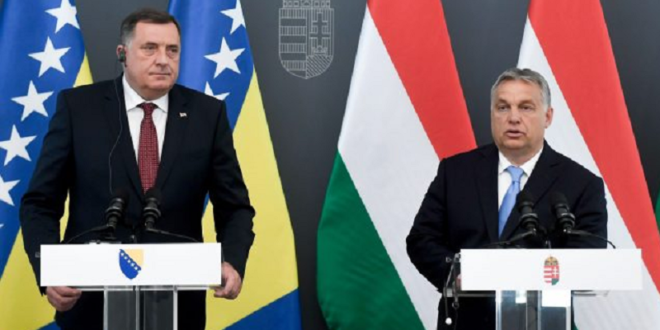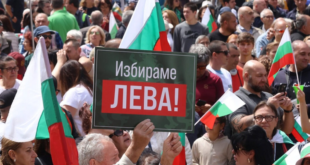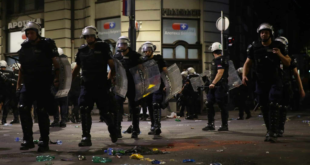The Hungarian premier’s weekend meeting with Bosnian Serb political leader Milorad Dodik has triggered speculation about possible private business deals or secret negotiations about the fate of Bosnia and Herzegovina.
Viktor Orban’s meeting with the Serb member of Bosnia’s tripartite presidency, Milorad Dodik, on Saturday has continued to puzzle experts and trigger speculation among Hungarian and Bosnian officials about the motives for the Hungarian Prime Minister’s visit to the Balkan country.
“There is no Hungarian national interest which would justify this visit,” said former Hungarian foreign minister and EU commissioner Peter Balazs told BIRN.
Balazs said that it is against diplomatic protocol to meet the Serb member of Bosnia’s tripartite presidency but not the other two. “This is clearly a provocation against the Croats and the Bosniaks,” he said.
Orban led a high-level Hungarian delegation that visited to Dodik’s hometown Laktasi in Bosnia’s Serb-dominated Republika Srpska entity on Saturday. He said he intended to return a favour after Dodik’s visit to Orban on September 24, yet details of the Bosnian visit remain sketchy.
Balazs, a former foreign minister and two-times ambassador, questioned whether the visit was coordinated with the EU and warned that it could cause considerable tensions with Brussels. The EU is currently seeking to get Dodik to step back from threats to take Republika Srpska out of Bosnia and Herzegovina’s state-level judiciary, indirect tax system and armed forces – moves which have been described as steps towards secession.
The mystery is even greater given the fact that the Hungarian delegation, which included Minister of Foreign Affairs and Trade Peter Szijjarto, used both the government’s planes – not just the Dassault Falcon business jet used by Orban, but also the larger Airbus A319, which is used for military transport, landed in Banja Luka. According to Flightaware.com, the A319 made a stop in Belgrade before arriving in Bosnia.
After the first part of the visit, the rest of the delegation left while Orban remained for a private lunch with Dodik, also visiting his private distillery.
Despite the fact that both Orban and Dodik love public attention, the visit was not covered much by local media, which Bosnian Serb sources said was on the specific request of Orban.
Istvan Szent-Ivanyi, Hungary’s former ambassador to Slovenia and an expert on the Western Balkans, said that Orban’s visit relates to his regional ambitions.
“Orban is looking for vassals in the Balkans, politicians who accept him as a regional leader and with whom he can have cordial ties,” Szent-Ivanyi said.
As well as Bosnian Serb leader Dodik, Orban is also politically close to Serbian President Aleksandar Vucic, Slovenian Prime Minister Janez Jansa and former North Macedonian Prime Minister Nikola Gruevski, who was given political asylum in Hungary in 2018 after fleeing his home country.
Dodik’s ‘dangerous game’
The timing of Orban’s visit was highly controversial, as Dodik has been widely accused of undermining the fragile unity of Bosnia and Herzegovina with his recent threats to leave state institutions.
“Dodik is playing a dangerous game, and Orban is a partner in this,” said Szent-Ivanyi says.
Most experts say that it is not a coincidence that Orban met Dodik only a week after the Hungarian premier hosted a meeting with High Representative Christian Schmidt, the international overseer of the peace agreement that ended the 1990s war in Bosnia and Herzegovina.
Nothing was published about this meeting except that the two “discussed the situation in Bosnia and Herzegovina”.
Schmidt is an old acquaintance of Orban’s – he served as vice president of the German Christian Socialist Party, CSU and was a minister in the Bavarian government during the refugee crisis in 2015.
Dodik has been challenging the legitimacy of Schmidt’s appointment, which was done without the approval of the UN Security Council, thus circumventing a probable Russian veto. Schmidt has complained that Dodik has refused to meet him since he started work in August.
One benevolent speculation is that Orban is coordinating between Schmidt and Dodik, preparing the ground for their meeting, but Szent-Ivanyi does not think this is a plausible explanation.
He said he suspects that there are some potential business dealings in the background. “Besides playing a regional leader’s role, Orban is primarily interested in making money for companies close to government,” he said.
Dodik mentioned cooperation in the energy sphere between Hungary and Republika Srpska, which might mean increasing the presence of Hungary’s oil and gas giant MOL, which already owns half of the petrol stations there, through its Croatian subsidiary, INA.
But former foreign minister Balazs dismissed the idea. “Look at the map, this a very small country and rather poor, what economic opportunity could it offer?” he asked.
Links with Russia suspected
Hungarian news outlet BALK suggested that the trip could have been motivated by the sanctions that the EU is threatening to impose on Dodik over his allegedly secessionist moves.
Hungary is often the odd man out in the EU, unwilling to support sanctions, and Orban could have ensured Dodik of his support, some observers have speculated. As a close ally of Serbian President Vucic, Orban is likely to be coordinating his steps with Belgrade, but possibly also with Moscow, which is also interested in destabilising the region, most critical media agree.
Orban insisted that his visit to Banja Luka was a “return” visit after Dodik was invited as a speaker to the Fourth Demographic Conference in late September, and was also received by Orban in his office.
“We came here for two reasons. Peace, stability and security in the Balkans are important to us, and the Serbs here play a key role in this. Hungarian history clearly illustrates that what happens here also affects us,” Orban was quoted by Hungarian national news agency MTI.
“In addition, it is also important for this region to develop,” he added, explaining that Hungary intended to support small and medium-sized enterprises in Republika Srpska, “and in this way we will also create opportunities for Hungarian entrepreneurs to operate here”.
Relations between Orban and Dodik have blossomed in the last two years. They first met in June 2019 in Budapest, when Orban said that in addition to its state-level relationship with Sarajevo, Budapest will also build close political and economic relations with Banja Luka.
Orban was rumoured to have been one of the authors of a controversial ‘non-paper’, an informal European policy document entitled ‘Western Balkans – A Way Forward’, which suggested that Bosnia and Herzegovina could be partitioned and Republika Srpska united with Serbia, which was leaked at the start of this year.
No evidence was found that Orban was responsible for the non-paper, which was sent by Slovenian Prime Minister Jansa to Charles Michel, the president of the European Council, but experts argued that considering Orban’s relationship with Vucic, it is hard to believe that Budapest had absolutely nothing to do with it.
 Eurasia Press & News
Eurasia Press & News




